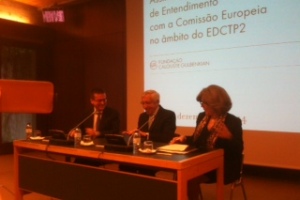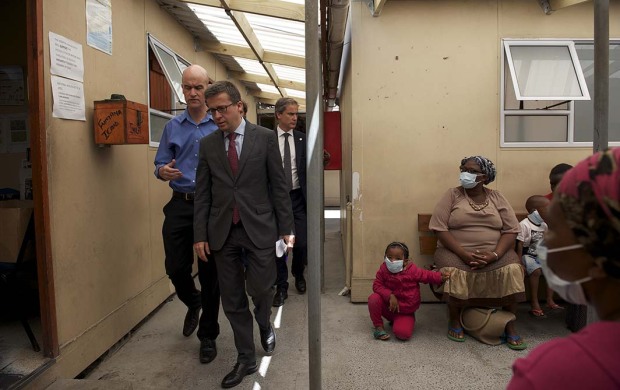EC Commissioner Carlos Moedas and Gulbenkian Foundation sign collaboration memorandum
Today, the Portuguese Calouste Gubenkian Foundation and EC Commissioner for Research and Innovation Carlos Moedas have signed a memorandum of understanding in Lisbon, Portugal. The memorandum will pave the way to more strategic cooperation in supporting global health research, in particular through EDCTP.
 Left to right: EC Commissioner Carlos Moedas, Artur Santos Silva and Isabel Mota (President and Administrator of the Calouste Gulbenkian Foundation respectively) at the signing.
Left to right: EC Commissioner Carlos Moedas, Artur Santos Silva and Isabel Mota (President and Administrator of the Calouste Gulbenkian Foundation respectively) at the signing.
This coincides with the prepublication today of an EDCTP 2015 Call for proposals aimed at strengthening the ethics and regulatory capacity in sub-Saharan Africa. This call will be a collaboration between EDCTP and the Calouste Gubenkian Foundation.
Commissioner Moedas released the following statement today:
Joining forces for research into diseases of poverty in Africa
Two weeks ago I had the pleasure to launch the second phase of the European and Developing Countries Clinical Trials Partnership (EDCTP) in Cape Town. Since it was set up in 2003, this joint programme has done invaluable work in providing better and new medical treatments against HIV/AIDS, malaria and tuberculosis for the people in sub-Saharan Africa.
I saw the impact of the EU’s investment on the health and lives of these young people with my own eyes. In South Africa, I visited a community clinic in the township Khayelitsha, and met a group of teenagers at the Despond Tutu HIV Foundation Centre in the township of Masiphumulele. I was impressed by their courage and life-affirming attitude, but also by the strong commitment from the medical researchers and clinical staff. I could see not only how the funding helps their work, but also how the Union’s involvement contributes to strengthening trust and partnership between our nations and continents.
That’s why it’s important that the second phase of EDCTP will work with a higher budget – nearly €2 billion over the next ten years – to which the EU will contribute €683 million. But I am also convinced that our efforts in developing better and new medicines can be even more successful if we extend our cooperation and join forces with other important funders of global health research. It allows for focusing joint investment on the most promising candidate medicines and for strengthening medical research capacities in Africa.
Today we made such a step. The Memorandum of Understanding with the Calouste Gulbenkian Foundation based in Lisbon that I signed today shall pave the way to more strategic cooperation in supporting global health research, in particular through EDCTP.
To that end, the Calouste Gulbenkian Foundation and EDCTP intend to jointly support the development of capacities in sub-Saharan Africa for the conduct of clinical trials in humans and more specifically the ethical review and regulatory capacities in Portuguese-speaking African countries. Last year, we made a similar joint pledge with the Bill & Melinda Gates Foundation to work together to fight HIV/AIDS, tuberculosis, malaria and other poverty-related diseases.
This effort is crucial as the African continent is by far the worst hit by ongoing health crises. Malaria and tuberculosis alone kill an estimated 2.1 million people annually, with approximately 90 % of all malaria-related deaths occurring in Africa. Sub-Saharan Africa also accounts for two thirds of all people living with HIV and for three quarters of AIDS-related deaths.
I strongly believe that by joining forces with the Calouste Gulbenkian Foundation, we can make an even bigger difference for millions of people.
More information:
Statement on the EC website
Calouste Gulbenkian Foundation Press Release, 15 December 2014:
Fundação Calouste Gulbenkian e Comissão Europeia assinam Memorando de Entendimento

